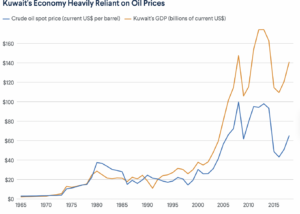Sep
25
Rentierism and Democracy
September 25, 2023 | | 2 Comments
The Middle East and North Africa region is characterized by the rest of the world as being incredibly resistant to democracy, prompting a specific focus on authoritarianism and the idea of a rentier state. Rentier states have rents on specific products, which in this case is oil, and charge foreigners for access to those rents. That money goes directly into the hands of the government creating a strong central power and impacting social and political outcomes. The rents themselves serve as a sign of societal disturbance, but it’s the resulting interactions they have with the government, civilians, and the economy that are particularly damaging.
In his study, “Does Oil Hinder Democracy?”, Michael Ross looks at the role of oil rents on democracy in the Middle East and globally. Specifically, he looks at the rentier effect, where resource-rich countries use low tax rates and patronage to avoid accountability from citizens. In understanding this tax effect, the motto is essential, “no representation without taxation”. The oil industry requires less labor and puts money directly into government funds, therefore, avoiding the involvement of civilians altogether. This money instead can go towards strengthening patronage. Ultimately, as a result of money accruing directly to the state, the civilians feel less entitled to democracy and representation, thus damaging political and social outcomes.
Along with using the money to bolster the government, it is also used to put down citizens. The repression effect is another topic that Ross talks about to explain that as resource wealth grows, the government will be more likely to spend it on internal security. Building up the military creates a power imbalance in which citizens don’t feel secure raising their voices. Many resource-rich countries have a mukhabarat state, in which there is an internal intelligence network where one can never be sure that their neighbor isn’t spying on them. It’s essentially like the Soviet KGB or the police under Saddam Hussein.

World Bank, Federal Reserve Bank St. Louis
Regarding the economy, resource-rich countries often find their private sector lacking as a result of a large and overbearing public sector featuring the oil industry. Due to the funds from these rents accruing directly from the state, the government has a more direct hand in controlling the public sector, which can lead to large population struggles if the industry is impacted.
This was seen with the 2008 recession in which many countries in the Middle East, specifically resource rich countries, had lingering effects of economic struggle as the oil industry’s success declined. An example of this would be Kuwait which, as evidenced by the graph, had a decrease in GDP when oil prices decreased during the recession. Additionally, the government also has a heavy hand in setting wages and the other industries that can find success, although they tend to be limited.
Ross claims that this is also not limited to just the Middle East or small countries. In fact, these results regarding a struggle for democracy in oil rent states are seen across the world. The interaction of these rents through the government and thus civilians and the economy makes it commanding and detrimental to democratization and stability of social and political life.
Work Cited:
Ross, Michael Lewin. 2001. “Does Oil Hinder Democracy?” World Politics 53, 3. (Apr.): 325-361
Cammett, Diwan, Richards, & Waterbury Chapter 9, 319-354
Comments
2 Comments so far
I like the graph that you included about how Kuwait was affected negatively by oil prices during the recession. It’s a great example of how rents have widespread effects that damage social and political conditions.
Very clearly explained.